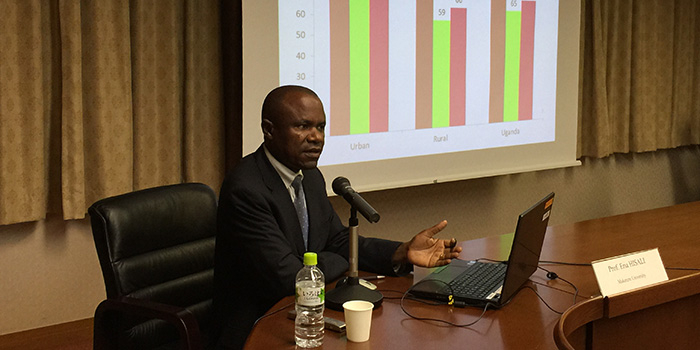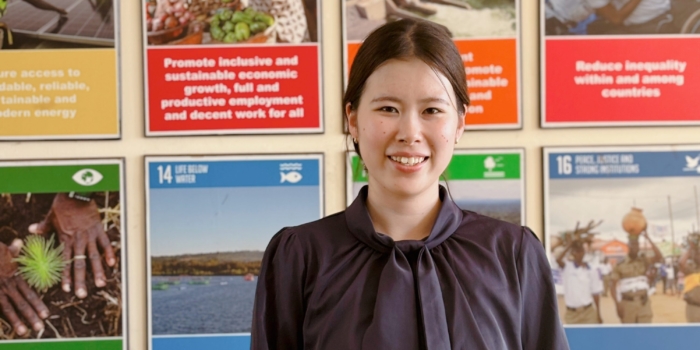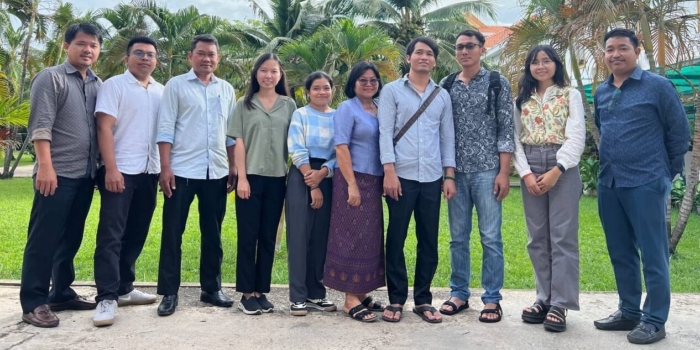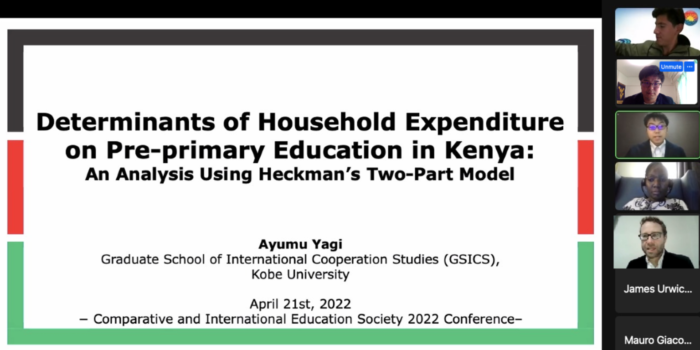On Tuesday 24th February 2015, the above seminar was held in the main conference room of Kobe University’s Graduate School of International Cooperation Studies. The speaker was Professor Eria Hisali from Makerere University, Uganda and the title of his presentation was “Human Resources Development and Labor Market Analysis in Uganda.”
 Professor Hisali’s presentation was structured into three parts: 1) characteristics of Uganda’s population; 2) education indicators; and 3) status of employment and unemployment in Uganda. On the subject of population characteristics, he informed the students present that one-fifth of Uganda’s population is below five years of age and 60% is below 18 years. He showed participants Uganda’s population pyramid, as evidence to clearly and graphical illustrate the distribution of various age groups in the population.
Professor Hisali’s presentation was structured into three parts: 1) characteristics of Uganda’s population; 2) education indicators; and 3) status of employment and unemployment in Uganda. On the subject of population characteristics, he informed the students present that one-fifth of Uganda’s population is below five years of age and 60% is below 18 years. He showed participants Uganda’s population pyramid, as evidence to clearly and graphical illustrate the distribution of various age groups in the population.
Regarding education indicators in Uganda, Professor Hisali shared with the seminar participants some of the key ones including but not limited to the national literacy rate for persons aged 10 years and above, primary net and gross enrolment rates by gender, secondary net and gross enrolment rates by gender, educational attainment by gender and location (rural or urban) for persons aged 15 years and above and proportion of persons aged 25-40 years with tertiary education.
The final segment of Professor Hisali’s presentation focused on the characteristics of Uganda’s labour force and he covered a number of aspects. For instance, he showed the official definition of working age population and its breakdown by gender and location in the context of Uganda. He went on to share with seminar participants the international classification of a working population, education attainment of the working population in Uganda by gender and proportion of working age population that is working and employed.
In addition, Professor Hisali demonstrated Uganda’s employment status and the various types of occupation by gender, as well as the median monthly nominal wages for paid employees. He concluded his presentation by explaining the status of unemployment in Uganda, illustrating the unemployment rate, percentage of youth aged 18-30 years who are jobless, children aged 5-17 involved in economics activities and the number of children in child labour.
After his very informative and stimulating presentation, Professor Eria Hisali responded to various questions from the participants. All the questions were aimed at understanding more about education and Uganda’s labour market. The presentation raised a lot of curiosity amongst those present. Overall, the seminar provided students with an opportunity to broaden and deepen their knowledge about education and labour market, especially in the context of Uganda.
Authored by Jeje Moses Okurut
Ph.D. Candidate
Related links
http://www.kobe-u.ac.jp/en/NEWS/event/2015_02_24_01_1.html
http://mak.ac.ug/
Related







